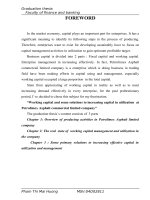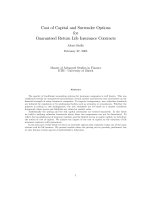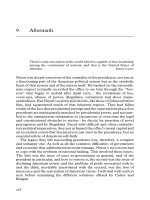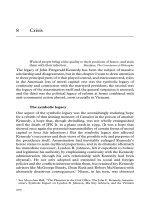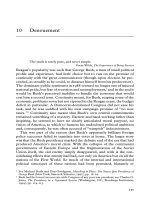Moral capital and leadership
Bạn đang xem bản rút gọn của tài liệu. Xem và tải ngay bản đầy đủ của tài liệu tại đây (96.43 KB, 18 trang )
2 Moral capital and leadership
He was more concerned to be a good man than to be thought one; and so
the less he courted fame, the more did it attend his steps unsought.
Sallust (on Cato), Conspiracy of Catiline
In the following chapters I will be looking at the politics of moral capital
largely through the prism of leadership. Leaders generally form a signiW-
cant repository of trust for those whose interests they try to advance, or
whose causes they actively and symbolically represent, or in whom they
have inspired some ideal to be realized. It is in studies of leadership, or in
political biographies, that students of politics most commonly address the
subject that I here label moral capital, usually under the banner ‘‘moral
authority’’ or ‘‘moral character.’’ (During electoral campaigns, it arises as
‘‘the character issue.’’) It is often clear from leadership studies that the
perceived character of a person along with assessment of their general
leadership competence is a signiWcant factor in the way they are appraised
and dealt with, not only by supporters and followers, but even by political
opponents.
1
Genuine respect facilitates the achievement of political goals,
while its absence or loss may make it impossibly diYcult to gain even
trivial ends.
My purpose is not, however, that of most leadership studies which try
to deWne kinds or qualities of leadership and the conditions under which
they are likely to emerge. I am not interested – except incidentally as it
may touch on the moral factor in leadership – in whether leadership is
best understood as a matter of the possession of certain physical and
psychological traits, or as an expression of diVerent behavioral styles, or
the result of the contingent situational contexts in which leadership
emerges, or as a causative process through which ‘‘charismatic’’ individ-
uals inXuence followers and subordinates.
2
I study certain leaders in
… See, e.g., Martin Benjamin, Splitting the DiVerence: Compromise and Integrity in Ethics and
Politics (Lawrence, University Press of Kansas, 1990), chapter 6.
On trait theory, see, e.g., R. Stogdill, Handbook of Leadership (New York, Free Press,
1974); and J. Conger, Learning to Lead (San Francisco, Jossey-Bass, 1992); on behavioral
theory, see R. White and R. Lippitt, Autocracy and Democracy: An Experimental Inquiry
27
order to understand the workings of moral capital in politics, not to
investigate the nature of leadership as such. Nevertheless, some general
points relevant to my enterprise may be derived from the leadership
literature.
Leadership: the moral dimension
The Wrst is the general recognition of the noncoercive, reciprocal nature
of the relationship between leaders and followers, or between leaders and
(to use a less loaded term) constituents. Leadership may involve the use
of power but cannot be reduced to an exercise of power, for it relies
crucially on persuasion. Though political leaders may occupy positions of
oYcial authority, acts of leadership are not authoritative commands since
constituents are not subordinates. Leaders are inevitably symbols, with
the top leader of a community or nation symbolizing the group’s collec-
tive identity and continuity. Leadership is thus generally distinguished
from management, partly on account of this symbolic role and partly on
the grounds that the leaders are less tightly linked to an organization than
are managers – and indeed some leaders may not be attached to any
organization at all.
3
The relative freedom of both political leaders and constituents means
that the relationship between them must generally be one of conWdence
and trust and not of coercion. I have stated that for moral capital to exist it
must have attractive and not compulsive power, that people must be
relatively free to judge for themselves and to exhibit uncoerced moral
consent. This is congruent with James MacGregor Burns’ deWnition:
‘‘Leadership over human beings is exercised when persons with certain
motives and purposes mobilize, in competition or conXict with others,
institutional, political, psychological, and other resources so as to arouse,
engage, and satisfy the motives of followers.’’
4
Moral capital may be
conveniently thought to be included among the ‘‘other resources’’ noted
here.
It was in fact Burns among modern leadership theorists who drew
speciWc attention to the moral dimensions of leadership. He distinguished
two forms of political leadership apt for diVerent conditions, the transac-
tional and the transforming. Transactional leaders are eVective horse-
(New York, Harper, 1960); and R. Likert, Human Organization (New York, McGraw-
Hill, 1967); on contingency theory, see F. Fiedler, A Theory of Leadership EVectiveness
(New York, McGraw-Hill, 1967); on charismatic or transformational theory, see B. Bass,
Performance Beyond Expectations (New York, Free Press, 1985); and A. Bryman, Charisma
and Leadership in Organizations (London, Sage, 1992).
À John W. Gardner, On Leadership (New York, The Free Press, 1990), pp. 2–3 and 18.
à James MacGregor Burns, Leadership (New York, Harper Colophon, 1978), p. 18.
28 Moral capital
traders, brokering deals between various interests represented by groups,
factions or parties. Typical of transactional leaders are those who domi-
nate the processes of complex legislatures like the American Congress.
They are means-dominated, status quo politicians who operate as insiders
within a pluralistic political environment, and for their leadership to work
they must observe what Burns calls modal values – honesty, responsibility,
fairness and the honoring of commitments. Transformational leaders, on
the other hand, attempt to alter the status quo and create a new political
culture. To do this they must be teachers who can elevate the motives,
values and goals of followers, uniting their particular interests in the
pursuit of ‘‘higher’’ goals. The values of transformational leaders are
end-values, like liberty, justice and equality.
5
Burns’ distinction recalls an earlier one made by Max Weber, who was
also concerned with the moral dimensions (and indeed the moral di-
lemmas) of political leadership. Weber observed a dichotomy in politics
between what he called an ethic of responsibility and an ethic of ultimate
ends, the former characterizing what can be broadly termed pragmatic
politics and the latter a ‘‘politics of conviction.’’ These were Weberian
‘‘ideal-types’’ of political action, as performed, on the one hand, by the
responsible leader who takes a relativistic view of a complex world and
prudentially weighs action, goals, means and foreseeable consequences
with cautious care; and, on the other, by the leader of conviction who is so
blinded by the absolute value of ultimate ends as to be largely indiVerent
to the actual present consequences of action. Burns, without noting the
parallel of Weber’s dualistic categorization to his own, argues that the
danger of the politics of responsibility is that it can lead to values so
hopelessly fragmented and relativized as to be able to justify anything,
thus cloaking hypocrisy and opportunism in undeserved moral raiment.
Conviction politicians, by contrast, are dangerous because of their fanati-
cal devotion to a single millenarian end-value that is both indiVerent to
and destructive of other values. Burns observes (again without noting the
applicability of the argument to his own dichotomization) that this dual-
ism is oversimpliWed, and that most leaders and followers in fact shift
back and forth from speciWc, self-involved values to broader, public-
involved ones. He argues that the ethic of responsibility is really the
considered, day-to-day application of the ‘‘ethic of ultimate ends’’ to
complex circumstance.
6
This view is in fact identical to that which Weber himself defended.
He argued that the ethic of ultimate ends and the ethic of responsibility
are not absolute contrasts, but supplements, which only in unison can
Õ Burns, Leadership,p.426. Œ Ibid.,p.46.
29Moral capital and leadership
constitute a man with a genuine ‘‘calling for politics.’’
7
The potential
barrenness of pragmatic, instrumental politics is redeemed by a passion-
ate, vitalizing attachment to valued ends; the irresponsibility of a passion-
ate conviction that dispenses with scruples in its drive to power is defeated
by a constant concern to appraise and reappraise both means and conse-
quences. This diYcult synthesis of realism and idealism is necessary for
Weber because of the tragic element he discerns in all politics. Politicians,
he argues, operate within a world that is ethically irrational, where the
consequences of action even for ‘‘good’’ ends are inherently unpredict-
able. Moreover, it is impossible to dodge the fact, he says, that all political
action is ultimately sanctioned by the use of force, and consequently that
attaining good political ends requires a willingness to pay the price of
using morally dubious means. ‘‘From no ethics in the world,’’ he wrote,
‘‘can it be concluded when and to what extent the ethically good purpose
‘justiWes’ the ethically dangerous means and ramiWcations.’’
8
The respon-
sible politician therefore takes on the burden of using sometimes dubious
and dangerous means for ends that cannot be wholly guaranteed, striving
for political success while trying to keep some proportionality between
the means employed and the ends desired, between political action and
actual consequences. The instrumentally rational ethic of responsibility
thus avoids the sin of ruthless monism while the passionate ethic of
conviction gives meaning to the compromises and casualties of pragmatic
maneuver. Weber argues that the politician to whom politics is a true
vocation must stand for something. ‘‘To take a stand to be passionate – ira
et studium – is the politician’s element, and above all the element of the
political leader.’’
9
Weber’s (and Burns’) ideal-types are better interpreted as the extreme
ends of a spectrum of possibilities of political practice and political
leadership. At the pragmatic extreme, politicians become so absorbed in
wheeling-dealing, number-counting and horse-trading – so involved in the
political game as given – that they forget (or cease to believe in) any larger
goals the game is supposed to serve. In these circumstances power may be
cynically used for frankly self-serving and client-serving ends, dispensing
even with a shield of hypocrisy to conceal its moral nakedness. At the other
extreme, power is placed at the service of an absolute value which con-
sumes all other values and interests and may annihilate all human interests
whatsoever. Particular political practices and particular leaders will oc-
cupy positions somewhere along this spectrum, leaning either more to-
ward the pragmatic, or more toward the politics of conviction.
œ Max Weber, ‘‘Politics as a Vocation,’’ in H. H. Gerth and C. Wright Mills (eds.), From
Max Weber (London, Routledge, 1970), p. 127.
– Ibid.,p.121. — Ibid.,p.95.
30 Moral capital
Weber was engaged in a normative exercise for the serious political
leader who, he believed, should occupy the diYcult middle ground
between the extremes. (Gandhi, who called himself a ‘‘practical-idealist,’’
also preached and tried in his own way to occupy this middle ground,
though unlike Weber he believed that ethically ‘‘pure’’ practical decisions
were both possible and necessary.)
10
A study of moral capital, however, is
more concerned with the relational aspects of leadership than with leader-
ship per se and must therefore consider the above-mentioned spectrum
from its own perspective. One may conclude that moral capital is unlikely
to be an important factor at either extreme. Cynically pragmatic politics
do not tend to inspire favorable moral judgments while the totalitarian
propensities of fanatical monomaniacs are, in the end, likely to prove
destructive of the capacity even for making such judgments. Short of
these extremes, the nature and force of political leadership, and of the
moral capital it inspires, must vary according to circumstances. In a stable
political environment with accepted institutions that are presumed to be
legitimate and to serve legitimate interests, the leaders that Burns calls
‘‘transactional’’ will gain moral capital by their eVectiveness and trust-
worthiness in brokering deals among plural interests. But challenges,
whole or partial, to the legitimacy of the status quo cannot be eVectively
carried or repulsed by such transactional leadership. These require an
emphasis on end-values typical of conviction politics or of transform-
ational leadership, and moral capital will accrue to leaders who eVectively
articulate, defend and symbolize these values. In circumstances where
bitter contestation and conXict occur over questions of legitimacy and
justice, moral capital will play a particularly conspicuous role. (It is for
this reason that I have chosen such circumstances for investigation in the
studies that follow.)
Weber did in fact deal with the relational aspects of leadership in a
discussion of the diVerent forms of authority and the diVerent styles of
leadership associated with them. He famously discerned three ideal-types
of these: the charismatic, the rational-legal, and the traditional or custom-
ary. I mention this Weberian ideal-typology because I mean to be clear
that when I speak of the moral capital of leaders I am not implicitly talking
about charismatic leadership. It is true that several of the leaders treated
in this book – Mandela, Aung San Suu Kyi, Kennedy – have often been
described as charismatic in the popular sense equally applicable to Wlm
stars, but none were charismatic leaders in Weberian terms. The criteria
he enumerated for charismatic leadership were: the demand that fol-
lowers put absolute trust in the leader personally as an ultimate authority
…» Still the best book on Gandhi’s thought is R. N. Iyer, The Moral and Political Thought of
Mahatma Gandhi (New York, Oxford University Press, 1973).
31Moral capital and leadership
and obey his or her will without question; the corresponding dissolution
of the authority of all ordinary rational-legal rules and norms; the forma-
tion of a Xuid, nonhierarchical community of followers bound together
by common devotion and submission to the leader; and proof in action of
the leader’s special, magical powers.
11
Charles de Gaulle comes closest to fulWlling these criteria, and it is true
that his career also lends itself peculiarly well to analysis in terms of moral
capital (a concept, indeed, he applied to himself). It is also true that I will
often be dealing with critical political situations of the kind in which
charismatic leaders have been observed typically to emerge. Yet crises
and large-scale conXicts over legitimacy do not necessarily produce
Weberian charismatic leadership. They do tend to produce leaders in the
heroic mold, but such leaders do not necessarily, or even usually, have the
messianically personal character attributed to charismatic leaders. Some
crisis-emergent leaders are in fact of distinctly unheroic mien, charismatic
in neither popular nor Weberian senses (think, for example, of Cory
Aquino of the Philippines). Their cases show clearly how the possession
of moral capital may elevate even quite ordinary persons into positions of
leadership. The dissident leaders, indeed, cannot be properly or wholly
understood in terms of any of Weber’s categories, which suggests the
incompleteness of the latter. My claim is that the concept of moral capital
reveals another dimension of authority that is important in the under-
standing of politics generally and of leadership in particular. If I tend to
dwell on crises and conXicts of legitimacy it is, to repeat, because the
political generation and operation of moral capital, and the dependency
of politicians on this as a resource, is most clearly and dramatically
revealed under such conditions. They are conditions which demand, and
therefore tend to produce, ‘‘transformational’’ leadership even among
leaders (like the American presidents I examine) whose authority derives
mainly from the rational-legal structure of political institutions in which
they hold oYce. The ‘‘teaching’’ function of such leaders lies in their
eVective deployment of rhetoric and symbolism to maintain the morale of
constituents, to inspire devotion and instil a sense of the rightness and
nobility of a cause, and to mobilize support for speciWc policy directions.
Moral capital and constituencies
The fact that leaders cannot exist without someone to lead raises a general
question about the relationship of moral capital to constituencies. Moral
capital subsists in the general judgment of people, but people’s judgments
…… Max Weber, Economy and Society (New York, Bedminster Press, 1968, originally pub-
lished 1922), pp. 242–245.
32 Moral capital
diVer, as we have seen, very dramatically. But if moral capital lies, so to
speak, in the eye of the beholder, then it would seem to follow that it must
be bound to speciWc constituencies that make up particular sets of be-
holders deWned by things like class, culture, interest, nationality and so
on. Moral capital, in other words, would appear to be bound to particular
constituencies, deWned by particular end-values and goals, within which
it is formed and maintained. Thus the Irish Republican Army appears
morally heroic to Republican sympathizers but hardly to Ulster loyalists;
a Ben-Gurion is honored by Israelis but despised by Palestinians. But this
obvious point has to be qualiWed in several ways that make the tie between
moral capital and constituency less tight than it might initially seem.
First, maverick loners do, by virtue of moral capital, occasionally attain
to positions of power in exceptional and critical circumstances. One
might point to the sudden ascent of Winston Churchill in the wartime
crisis of 1940 despite a patchy and controversial political career up to that
point and despite his lack of either a signiWcant electoral constituency or
of a power base among fellow parliamentarians. Churchill was appointed
because he had stood in long, vocal and rather lonely opposition to the
rise of Nazi Germany in the 1930s, and had called repeatedly for Britain to
arm against the threat of it. This singular stance, dismissed as an irritant
in a Britain desperate to avoid another debilitating conXict, turned sud-
denly into a substantial fund of moral capital once Hitler had propelled
Europe into war. It lent huge authority to Churchill’s remarkable oratori-
cal eVorts to rouse a dispirited nation to action and defense, creating a
single united constituency out of the whole nation at a critical time. By
contrast, Churchill’s favorite beˆte noire and fellow maverick, Charles de
Gaulle, tried to stand for all of France all the time, basing his career, as we
shall see in Chapter 4, on a general appeal across particular constituencies
and classes to an ideal that transcended them all.
Secondly, though politicians and parties may have their prime constitu-
encies, they must often appeal beyond these to wider national or interna-
tional audiences if they are to hope to achieve their political aims. This
may create dissonance and tension if the values and expectations of the
wider constituency diVer signiWcantly from those of the narrower. Wit-
ness, for example, the diYcult and dangerous balancing act of Sinn Fein
leader Gerry Adams as he tried to maintain the necessary trust and
acquiescence of the ‘‘hard men’’ of the Provisional IRA while presenting
himself internationally as a man of peace and reason in order to negotiate
a settlement in Northern Ireland. On the other hand, if values are con-
gruent, wider moral entreaties can have the eVect of strengthening a
political position without threatening rebellion in one’s own back yard;
the international moral appeal of Aung San Suu Kyi, for example,
33Moral capital and leadership
